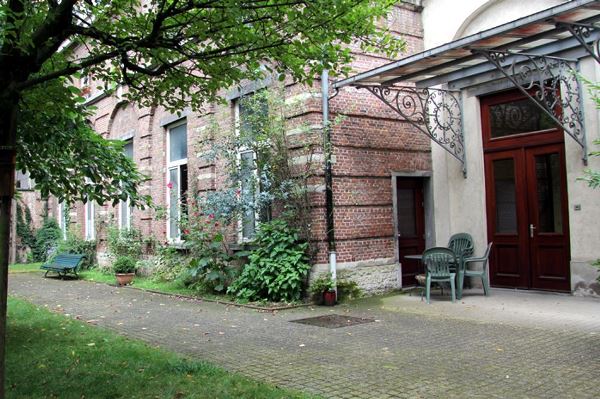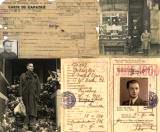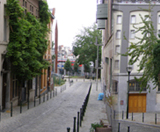Summary, abstract and full texts no. 108
Dossier: Le traitement de l'histoire dans les documentaires filmiques
Coordinated by Sonia Combe, with the collaboration of Hélène Zylberait
Sonia Combe: Le traitement de l'histoire dans les documentaires filmiques (pdf)
Isabelle Veyrat-Masson: L'historien face au docufiction (pdf)
- Paul Ricoeur wrote that "the reader of a historical text expects the author to offer him a 'true story' and not a fiction. This raises the question of whether, how, and how far, the writing of history can respect this tacit pact with the reader". Similar questions arise regarding the relations between the historian and that new type of television program, the docufiction: "expectation", "true story", "fiction", "tacit pact with the reader", "history"… completed, of course, by "the viewer’s" expectation, fiction-"reconstitution", and with the addition of the words television, images, impression of reality, documents, plus a mention for the genres: documentaries, fiction, archives, hybrids. Finally, there are questions in relation to the invention of a genre which proposes to use the methods of fiction to tell the truth. What is the specificity of history in relation to the notion of truth? How should falsity be defined? How does the historian react? What is the relationship between image and reality? What are the risks of confusion?
Sonia Combe: La Résistance ou le balancier de l'histoire (pdf)
- "The Resistance", a docufiction shown at prime time in autumn 2008, seems to have definitively legitimized the genre. This is shown by its reception in the press, where criticism barely referred to its form, with by the public, as it is estimated to have been watched by more viewers than a transmission of Spielberg’s Jurassic Park. Produced with the assistance of 10 historians and under the patronage of Simone Veil, the work was vouched for twice over, both by scholars and by a witness possessing strong symbolic importance. "The Resistance" had a real subject: casting light on people who were not heroes or even members of the resistance, but who resisted as best they could, at their own level and with the means at their disposal. But by seeking to challenge the "authorized version of the 1970’s" deriving from Ophüls’ documentary Le chagrin et la pitié and the work of the American historian Robert Paxton, the film created the legend of a France which allegedly saved 250,000 Jews. Must television challenge so-called accepted ideas because it prefers show business to historical truth?
Fanny Lautissier: Sous les bombes, (re)construction du temps présent (pdf)
- History as shown on television is written using methods which break down what were once considered as the essential barriers between "documentaries" and fictional films, and between productions made for the cinema and for television. This mingling becomes still more complex when the representation of present-day history is concerned. Sous les bombes (95’, 2007), the second feature film by the Franco-Lebanese director Philippe Aractingi, is a film which blurs the differences. It is set in the 33-day war in the Lebanon, and the story follows the journeys of a mother searching for her missing son and of a taxi-driver from Southern Lebanon. By not envisaging history solely through a referential approach, and by questioning the relationship between personal and collective history, Philippe Aractingi sets out to try to reconstruct the present day.
- This documentary retraces the history of the women’s orchestra at Auschwitz, through the testimony of 12 survivors located by the director. Diverging memories on whether or not they played during selections lead to renewed questioning of the role of music in the concentration camps, and of the role of the historical adviser. What should he do when faced with opposing memories? Apart from the fact that each of these women experienced exceptional events, is it not possible to see the work of time in their memories, that "repairing" of memory to make it less unbearable, less painful? And what right is there to uphold one truth against another? Each woman had her own truth, which reflected her subjective memory of traumatic events, her strategy for going on living with "that". The film’s approach tends to respect this point of view. This article, written by the film’s historical adviser, is accompanied by often diverging comments from the director, Michel Daëron, and the editor of La Chaconne d’Auschwitz, Eva Feigeles.
Interview (in French) with Jacques Kirsner, director and producer (JEM productions) (pdf)
Interview (in French) with Michel Daëron, director (pdf)
Interview (in French) with Serge Viallet, director (pdf)
Mathias Steinle: Le passé du Troisième Reich dans le « Dokudrama » du présent allemand (pdf)
- Following the fall of the Wall, the history of Germany changed, and with it the relationship to history, a national history marked by the Second World War and Auschwitz. In the context of a new memorial culture, the "Docudrama", an audiovisual type of docufiction about events which attracts viewers, has become essential. Docudramas include both films produced for public and private television and films which were first shown on the big screen like Untergang [Downfall] (2004). Although these films do not deny or falsify historical truth, by giving a new meaning to the "key" signs of the Shoah, they do tend to present the Germans as victims of the nazis. This tendency characterizes not only films on the war and the destruction of the Jews, but also films on the post-war period. West Germany is seen as having become reconciled to the phantoms of the past, while communist Germany, the GDR, is shown as a form of continuity with national-socialist totalitarianism.
Interview with Annette Becker and Laurent Veray by Philippe Mesnard: Sans bruit ni fureur (pdf)
Other subjects
Jacques Aron: Interroger nos concepts. Holocauste, Shoah, génocide (pdf)
- To be recognized, an event must be named. The "Auschwitz" event, the destruction of one people by another, for the redemption of that other people and humanity as a whole, is perceived today in its monstrosity as a major rupture in an ideal perspective of progress towards a higher civilization. This forces us – should force us – to question thoroughly all its historical aspects. This being so, and provided we accept the assumption that no human event is unimaginable, even though its potentiality does not mean that the form it might take can be predicted, the name attached to the event (Holocaust, Shoah, genocide, Judeocide, etc.) has its importance. It focuses the imagination and acts as a touchscreen for intellectual research into the concepts most appropriate for understanding it. And if knowledge of the mechanisms (factual, rational and irrational) is lacking, it is unrealistic to expect any collective influence over human history.
- Following the transfer of prisoners of war which began in 1940, from June 1942 until the end of the conflict, several thousand French workers went to Germany. Remembrance of these workers poses certain problems in light of the complexity of their history. It is that history which is examined here, particularly the history of Henry Roland, who, because he had disobeyed orders he had received in the firm which employed him, was transferred for a month to Neue Bremm, a Gestapo camp situated on the Franco-German border, near Saarbrücken in the Saar. He was one of the activists who fought to have these workers granted the status of deportees, at a time when this was disputed, notably by the associations representing resistance members and deportees.
Bookstore (pdf of Book reviews)
- Aster Misha, Sous la baguette du Reich. Le Philharmonique de Berlin et le national-socialisme, Paris, Héloïse d'Ormesson (Coll. “Aster”), 2010.
Review in French by Maurice Jaquemyns - Maurice Olender, Race sans histoire, Paris, Points (Coll. “Points Essais”, n° 620), 2009.
Review in French by Maurice Jaquemyns
Some of our projects
Contact
Auschwitz Foundation – Remembrance of Auschwitz
Rue aux Laines 17 box 50 – B-1000 Brussels +32 (0)2 512 79 98
+32 (0)2 512 79 98 info@auschwitz.be
info@auschwitz.be
BCE/KBO Auschwitz Foundation: 0876787354
BCE/KBO Remembrance of Auschwitz: 0420667323
Office open from Monday to Friday 9:30am to 4:30pm.
Visit only by appointment.
![]()
![]()
![]()
![]()
![]()
Become a member
To become a member of Remembrance of Auschwitz ASBL, please contact us and transfer the sum of €50.00 to our account IBAN: BE55 3100 7805 1744 – BIC: BBRUBEBB with the communication: ‘Membership fee 2025’. The membership includes two issues of 2025 of our scientific journal.
DONATIONS
Donations of €40.00 or more (in one or more instalments) qualify for tax exemption for Belgian taxpayers.
In communication, please specify that it is a ‘Donation’ and mention your National Number which is required since 2024 to benefit from the tax exemption.
Subscribe
Error : Please select some lists in your AcyMailing module configuration for the field "Automatically subscribe to" and make sure the selected lists are enabled










 The Auschwitz Foundation was founded in 1980 by Paul Halter, an Auschwitz survivor. Replacing the Amicale Belge des Ex-Prisonniers politiques d’Auschwitz-Birkenau Camps et Prisons de Silésie, the primary objective of the Auschwitz Foundation is to study the history and memory of the victims of the Holocaust and the Nazi terror in a sustainable and systematic way. The transmission of memory and the preservation of archives concerning these events complete this goal.
The Auschwitz Foundation was founded in 1980 by Paul Halter, an Auschwitz survivor. Replacing the Amicale Belge des Ex-Prisonniers politiques d’Auschwitz-Birkenau Camps et Prisons de Silésie, the primary objective of the Auschwitz Foundation is to study the history and memory of the victims of the Holocaust and the Nazi terror in a sustainable and systematic way. The transmission of memory and the preservation of archives concerning these events complete this goal.





